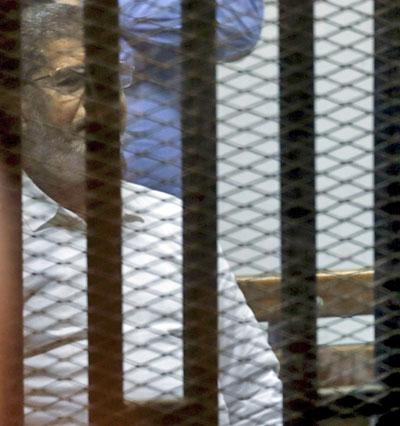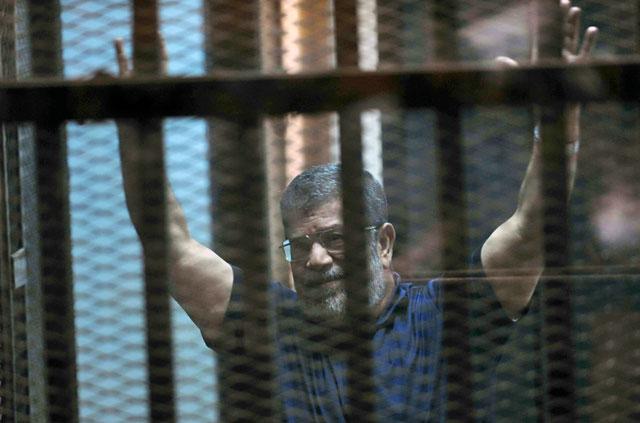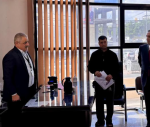You are here
Former Egyptian president Morsi jailed for 20 years
By Reuters - Apr 21,2015 - Last updated at Apr 21,2015

CAIRO — Muslim Brotherhood leader Mohamed Morsi was sentenced to 20 years in prison without parole on Tuesday on charges arising from the killing of protesters, nearly three years after he became Egypt's first freely elected president.
Morsi stood in a cage in court as judge Ahmed Sabry Youssef read out the ruling against him and 12 other Brotherhood members, including senior figures Mohamed Al Beltagy and Essam Al Erian. The sentencing was broadcast live on state television.
The men were convicted on charges of violence, kidnapping and torture stemming from the killing of protesters during demonstrations in 2012. They were acquitted of murder charges, which carry the death sentence.
A lawyer for some of the defendants said they would appeal.
Amnesty International described the ruling as "a travesty of justice" that "shatters any remaining illusion of independence and impartiality in Egypt's criminal justice system".
The rights group called for Morsi to be retried in a civilian court "in line with international standards" or released.
Leading Egyptian cleric Sheikh Youssef Al Qaradawi, who lives in pro-Brotherhood Qatar, criticised the ruling.
"The judiciary in Egypt is no longer one of the three [branches of] power. Instead, all the powers and the country itself are now run by the military," he said in a statement.
Egypt's US-backed government says the judiciary is independent and it never intervenes in its work.
Displaying a four-finger salute symbolising resistance to the state's crackdown on Islamists, defendants in a makeshift courtroom on the outskirts of Cairo chanted "God is Greatest" after the verdict was read.
The ruling is the first against Morsi, who says he is determined to reverse what he calls a military coup against him in 2013 staged by then army chief, now president, Abdel Fattah Al Sisi.
Amr Darrag, a Morsi-era minister, said the Brotherhood would remain a powerful force, with younger members taking up leadership roles made vacant by the state's crackdown.
“The overall attitude of the Brotherhood [is] more revolutionary because the generation taking it over is young and more revolutionary and they saw what kind of an Egypt we’d have if they don’t do what they have to do,” he told Reuters in an interview in Istanbul.
Morsi’s son, Osama, said his father plans a comeback despite the jail sentence
State news agency MENA quoted a security source saying Morsi was taken by helicopter back to Borg Al Arab prison near Alexandria, where he has been held for more than a year.
Morsi faces charges in four other cases including leaking secrets to Qatar, conspiring with the Palestinian militant group Hamas to destabilise Egypt, and organising a jailbreak during the 2011 uprising against Hosni Mubarak.
After toppling Morsi following mass protests against his rule, Sisi proceeded to crush the Brotherhood, which he says is part of a terrorist network that poses an existential threat to the Arab and Western worlds.
The Brotherhood says it is a peaceful movement that will return to office through people power, even though demonstrations have fallen to a trickle.
The verdict did not appear to trigger significant protests, another sign of the Brotherhood’s waning influence.
Deep state
Egypt’s deep state apparatus — the interior ministry, intelligence services and army — now appears to have a tighter grip than ever on the most populous Arab nation.
While Morsi has become far less relevant, even within the Brotherhood, Sisi was elected president last year, winning over many Egyptians who overlooked widespread allegations of human rights abuses for the sake of stability.
Egypt’s allies Saudi Arabia and the United Arab Emirates, which also see the Brotherhood as a threat, have been pouring billions of dollars into the Egyptian economy to support Sisi since Morsi’s fall.
Hundreds of Brotherhood supporters have been sentenced to death since Morsi’s removal and thousands more detained.
By contrast, a court in November dropped its case against Mubarak over the killing of protesters in the 2011 uprising that ended his 30-year rule and symbolised hopes for a new era of political openness and accountability.
Mubarak’s sons have been released from jail pending retrial in a corruption case involving his former palaces.
Businessmen who thrived under Mubarak’s era of crony capitalism have regained influence.
Western powers that called for democracy declined to use leverage against Sisi, the latest military man to seize power.
Morsi, who rose through the ranks of the Brotherhood before winning the presidency in 2012, was a polarising figure during his troubled year in office, which followed Mubarak’s fall.
Morsi’s policies alienated secular and liberal Egyptians, who feared that the Brotherhood — the main opposition to Mubarak for decades and popular among many Egyptians for its charity work — was abusing power.
Protests erupted in late 2012 after Morsi issued a decree expanding presidential powers — a move his supporters say was necessary to prevent a judiciary still packed with Mubarak appointees from derailing a fragile political transition.
Those demonstrations led to the deaths of protesters, for which prosecutors argued that Morsi and other Brotherhood leaders were responsible. Morsi and his co-defendants denied the charges.
Reda Sanoussi, the brother of one of the victims, was unhappy with the dismissal of murder charges against Morsi.
“I want to enter the cage and pull out his intestines,” he told Reuters.
Related Articles
CAIRO — An Egyptian appeals court upheld on Saturday a 20-year sentence for ousted president Mohamed Morsi, the first final ruling in a stri
CAIRO — Former Egyptian president Mohamed Morsi will appeal a conviction for violence, kidnapping and torture imposed by a court over the ki
An Egyptian court sentenced ousted president Mohamed Morsi and over 100 others to death Saturday over a mass prison break during the 2011 uprising that toppled Hosni Mubarak and later brought Morsi's Islamist movement to power.
















